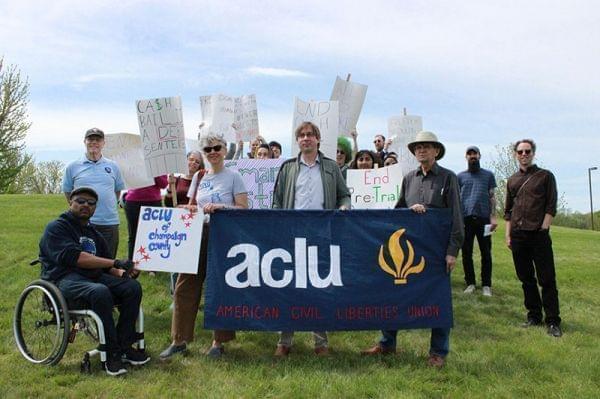Illinois Supreme Court Commission On Pretrial Practices Hosts Public Hearing In Urbana

Before the hearing, organizers held a rally at Canady Park in Urbana. Members from organizations including the Champaign County Bailout Coalition, ACLU of Champaign County, First Followers, Believers Bail Out, and the Coalition to End Money Bond attended both the rally and the hearing. Angela Kerndl/Illinois Public Media
The Illinois Supreme Court Commission on Pretrial Practices is hosting a series of public hearings for community members and organizations to voice their opinions on pretrial reform. Monday’s listening session in Urbana was the second of three hearings taking place across the state.
The Commission was formed in December, 2017 to review concerns about Illinois’ pre-trial bond system.
Members from organizations such as the Champaign County Bailout Coalition, ACLU of Champaign County, First Followers, Believers Bail Out, and the Coalition to End Money Bond offered recommendations for reforms they say will prevent people from getting punished for being poor.
The hearings come after several months of calls from communities across the state to open the Commission’s process up to the public.
Until recently, the Commission’s process has taken place behind closed doors since it is convened by the judiciary. This means its process is subject to neither Freedom of Information Act requests nor the Public Meetings Act.
State Rep. Carol Ammons (D-Urbana) and State Sen. Scott Bennett (D-Champaign) are both on the Commission, which is comprised of members of all three branches of Illinois government and criminal justice stakeholders.
The Commission is charged with conducting a comprehensive review of the state’s pretrial detention system and making recommendations for amendments to state laws, Illinois Supreme Court Rules and policies, as necessary, to ensure pretrial practices in all jurisdictions in Illinois are consistent, in form and substance, with the court’s policy statement on pretrial services.
The Commission provided a prelimenary report to the Illinois Supreme Court in December, 2018.
At Monday's hearing, Rep. Ammons said if someone is pretrial and hasn't been found guilty of anything, they should not be sitting in a county jail, unless a judge says they are unequivocally a risk to the community.
"Outside of that, majority of the people should be released so that they can A. prepare for trial, and B. find attorneys and continue to work and live until they are either found guilty or not,” Ammons said.
About twenty people who say they have been hurt by the current cash bail system shared their stories.
James Corbin of First Followers said he sees the effects of high bail on a lot of individuals who come into the drop-in center he works at.
He shared his own experience years ago of waiting in jail, pretrial.
“It’s an experience that nobody should have to go through, especially if you've got to sit there," Corbin said. "Soon, hours turn to days, days turn to weeks, weeks into months, and you just sitting, and you’re like what do I do? You’re already lost. You’re already defeated. You don’t know which way to go."
Corbin said his grandmother was able to get him out by cashing in some of her insurance money. His trial took eight months to start, but he had to wait in jail for about three to four months before his grandmother was able to pay bail.
"Long story short, I took a plea bargain because I didn’t feel like dealing with this. You know, I was already defeated," Corbin said, "There's no way you could understand this unless you’re on the other side and you experience this. And sitting in Cook County, you’re exposed to gang violence. You’re not at home. I lost my part time job sitting in there. I had a son at that time. Now you get back out and you’re trying to start again but you can't even start over because you still got to fight this trial," Corbin said.
“The overarching theme is very clear, if you have money, you can get out. If you don’t, you can’t, and we need to address that,” Ammons said,
The final hearing will be held in Chicago on June 17th.
Written public comment can also be submitted via email to pretrialhearings@illinoiscourts.gov, or by mail to:
Pretrial Comments
AOIC Probation Division
3101 Old Jacksonville Road
Springfield IL 62704
According to the Preliminary report, the Commission “will endeavor to make recommendations that ensure that pretrial justice in our state is fair and evidence-based but serves to protect against the risk that an individual will fail to appear in court or pose a threat to the safety of the community.”
After reviewing all of the statements at the public hearings and comments recieved, the Commission will prepare final recommenations for reform to the Illinois Supreme Court in December.
A law passed in 2017 requires judges to take a defendant's economic circumstances into account when setting bail.
